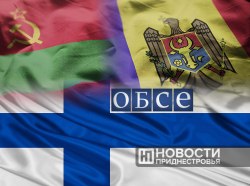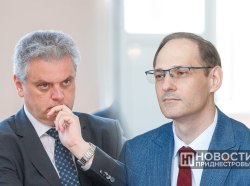So, we are in 2016. In the Chinese calendar, though, we still have a few weeks until 8 February when the year of Red Monkey starts. But it will not take long. This will put an end to the New Year holidays and we will finally live in 2016.
Looking back at 2015, there are three things to recall. First, Pridnestrovie, the only CIS country, has maintained the currency exchange rate. At the same time, the government had managed to clear all pension debts by the end of last year and pensioners had not lost a dollar from their real incomes.
Pridnestrovie's monetary policy in maintaining the rouble exchange rate for 4 years may be included in economics textbooks someday. Of course, this practice is specific in many respects and has reverse sides. Pridnestrovian exporters, especially those trading with the east, are facing difficulties because of exchange differences and they are constantly asking for depreciation. But maintaining the rouble exchange rate is not bad for the consumer market. Besides, we can see the effects of depreciation in neighbouring countries, and we would face even worse implications, economists say.
Therefore, we must act like Robinson Crusoe after finding himself on a desert island. As you remember, he took a list, divided it into two parts and headed the left part «bad» and the right «good». Then he estimated good and bad things in his situation and came to conclusion that good things prevailed. Modern specialists would call it a SWOT analysis.
Despite all turmoil near our boarders, 2015 ended peacefully. There were moments, though, when it seemed something bad might start, especially on the Ukrainian border. Some people in Ukraine demanded to «finally put an end» to Pridnestrovie. Troops and S-300 surface-to-air missile system were concentrating near Odessa. But everything turned out all right, which is the good outcome not only for Pridnestrovie, but also for Ukraine and Moldova.
And finally, in 2015 we retained duty-free access of our goods to the EU market. In December we could have a sigh of relief — the problem that had concerned many people in the PMR since 2013 was solved. There are issues, however, related to the practical implementation of the trade regime with the EU. For instance, how will the zero duties on EU goods (Pridnestrovie is to remove all duties in two years) affect our trade relations with Russia? How to solve the problem of bank transactions with EU states, which was discussed by heads of enterprises at a Chamber of Commerce and Industry (CCI) meeting in December? And finally, is it possible that, despite the existing EU decision, the Moldovan authorities will treat it in their own way and prevent Pridnestrovian exports from going to the EU market?
***
This year must give answers to other issues in our relations with the neighbours. A new government led by Pavel Filip was approved in Moldova the other day. As always, we expect of the new government better relations with Pridnestrovie. But it is difficult to say anything so far as the lot of Filip's cabinet is still unclear. Opposition protests are continuing in Molodva and are unlikely to cease soon. Besides, another problem is soon to arise — the presidential term of Nicolae Timofti is expiring and the current parliamentary majority will have to scrape 61 votes together to elect a new president. Now they have only 55 or 57 votes. If the president is not elected, the parliament will be dissolved and early elections will be held. Therefore, the recent approval of Moldova's cabinet has not solved anything.
The composition of the new government cannot encourage Pridnestrovie. The pro-Romanian Liberal Party has retained all its posts and Gheorghe Balan, who already was the head of the reintegration bureau but did not succeed in improving the relations between Kishinev and Tiraspol, has been appointed vice premier on reintegration.
It is only fair to say that it is not clear at all what Pridnestrovie should expect of the Moldovan opposition — both right and left wing? Things may turn even worse.
Many issues in 2016 are likely to concern the Moldo-Ukrainian plans to establish joint customs control on the Pridnestrovian-Ukrainian border. What may it result in for Pridnestrovian businessmen, taking into account, among other things, a serious difference between the Pridestrovian and Moldovan legislation?
There is another issue so far — how will the current trade wars between Russia and Ukraine affect Pridnestrovie's trade relations with the east? That they are capable of affecting both exports and imports has recently become evident when Russian cargoes were detained on the Russian-Ukrainian border, in particular at the Troebortnoye-Bachevsk checkpoint, Bryansk region. Everything got settled then, and Ukraine's government issued a list of checkpoints available for the transit of the Russian goods. Practice has showed, however, it may not be the only obstacle in trading with the east.
This year, finally, it will be curious to watch Germany's OSCE Chairmanship. Here we come to a broader political avenue. It may be curious because Germany as a major EU country has always showed intense interest in the Pridnestrovian settlement. We remember the Medvedv-Merkel plan which was so much talked about. Will the German chairmanship be quite mundane towards us (as was the case with other countries) or bring about some fresh ideas? We will probably see it in the second half of the year if Moldova, which is another side in the settlement process, regains some stability.
Pavel Uvarov








